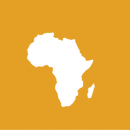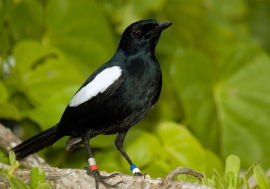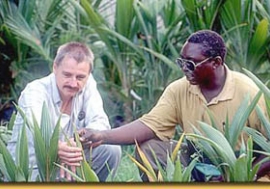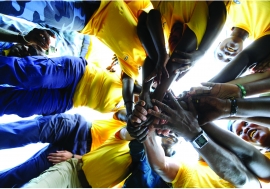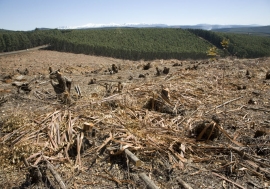Africa Watch
millennium goals
UN to galvanize action on African poverty
At the initiative of UN Secretary-General Ban Ki-moon, leaders of the United Nations and other key international institutions have vowed to work together more closely to boost Africa’s efforts to reduce poverty and improve human well-being. Halfway to 2015, not one country in sub-Saharan Africa is on course towards meeting all of the Millennium Development Goals (MDGs) approved by world leaders in 2000, Mr. Ban noted at the first meeting of the new MDG Africa Steering Group, held at UN headquarters in New York on 14 September. “We must help those countries so that they can join and get on track,” he affirmed.
The Secretary-General called the gathering an “unprecedented meeting,” given the range of participants. In addition to Mr. Ban, they included World Bank President Robert Zoellick, European Commissioner for Development and Humanitarian Aid Louis Michel, International Monetary Fund Deputy Managing Director Murilo Portugal and Mr. Maxwell Mkwezalamba, representing the Commission of the African Union, the continent’s political body. Also taking part were UN Deputy Secretary-General Asha Rose Migiro and UN Development Programme Director Kemal Dervis. African Development Bank President Donald Kaberuka and Islamic Development Bank President Ahmad Mohamed Ali Al-Madani participated by video link. (A representative of the industrialized countries’ Organization for Economic Cooperation and Development subsequently joined a working group meeting in New York on 20 September.)
Although Africa as a whole is not on track to meet the MDGs, the participants observed, some individual countries will be able to achieve at least some of the goals. “Success stories throughout the continent show that the goals remain achievable if governments and the international community urgently implement existing commitments to strengthen domestic policies and scale up investments.”
The Steering Group members vowed that their institutions would better coordinate their efforts and focus on “practical steps” towards achieving five of the eight MDGs by 2015: cutting by half the proportion of people living on less than a dollar a day, ensuring that all children complete a full course of primary schooling, slashing the child mortality rate by two thirds, reducing maternal mortality by three quarters and re-versing the spread of HIV/AIDS and the in-cidence of malaria and other major diseases.
To help Africa’s efforts, the international institutions pledged to work together within African countries, as well as to increase their assistance and make such aid more predictable, to facilitate African planning. But the main responsibility rests with Africa, emphasized Mr. Mkwezalamba of the African Union, by taking the initiative to mobilize its own resources, within African countries and from Africans living abroad.
Appointments
 Photograph: UN Photo / Mark Garten
Photograph: UN Photo / Mark GartenThe UN Secretary-General has appointed Mr. Cheick Sidi Diarra of Mali as high representative for least developed countries, landlocked developing countries and small island developing states. Over more than 25 years in international relations, law and development, Mr. Diarra has been involved in the national reconciliation efforts in Mali. Prior to his UN appointment, he served as permanent representative of Mali to the UN in New York, and in that capacity was chairman of the Group of Landlocked Developing Countries. Mr. Diarra replaces Mr. Anwarul Chowdhury of Bangladesh.
 Photograph: UN Photo / Jean-Marc Ferrel
Photograph: UN Photo / Jean-Marc FerrelMr. Sha Zukang of China has been appointed by the UN Secretary-General as under-secretary-general for economic and social affairs. A former permanent representative of China to the UN office in Geneva, Mr. Sha also served in key leadership capacities in the International Labour Organization, UN Trade and Development Board, UN Conference on Trade and Development and the Human Rights Council.
 Photograph: UN Photo / Ryan Brown
Photograph: UN Photo / Ryan BrownMr. Srgjan Kerim of the Former Yugoslav Republic of Macedonia was elected president of the 62nd session of the UN General Assembly on 24 May. He has served as his country’s foreign minister and minister for foreign economic relations, as well as an ambassador to several countries in Europe and as permanent representative to the UN.
 Photograph: UNCCD
Photograph: UNCCDThe UN Secretary-General has appointed Mr. Luc Gnacadja of Benin as the new executive secretary of the UN Convention to Combat Desertification (UNCCD). In his former capacity as minister of environment, housing and urban development in Benin, Mr. Gnacadja participated in UNCCD meetings and served as chairman of the African Ministers Conference on the Environment. He succeeds Mr. Hama Arba Diallo of Burkina Faso.
The Board of the Global Fund to Fight HIV/AIDS, Tuberculosis and Malaria has appointed Dr. Michel Kazatchkine of France as executive director. He has been active in combating HIV/AIDS for 20 years, as a leading physician, researcher, administrator, advocate, policymaker and diplomat. In February 2005, Mr. Kazatchkine was named France’s global HIV/AIDS and communicable diseases ambassador. From 1998 to 2005, he was director for the French National Agency for AIDS Research, while also serving as head of the Department of Immunology and the Clinical Immunology Unit at the Hôpital Européen Georges Pompidou.
Mr. Sergio de Queiroz Duarte of Brazil has been appointed high representative for disarmament by the UN Secretary-General. In that capacity ee will head the UN Office of Disarmament Affairs, the successor to the Department of Disarmament Affairs. Prior to this appointment, Mr. Duarte served as his country’s ambassador to numerous countries, including Nicaragua, Canada, China and the US and played leadership roles in international nuclear non-proliferation activities.

